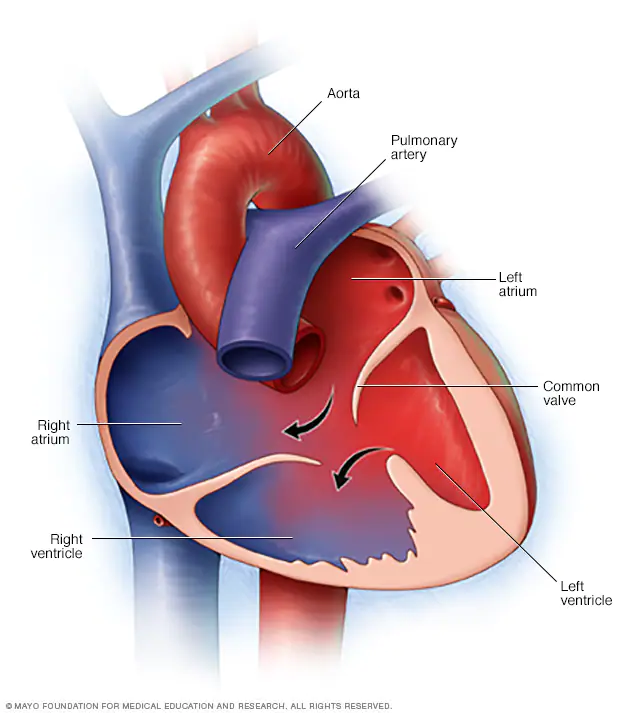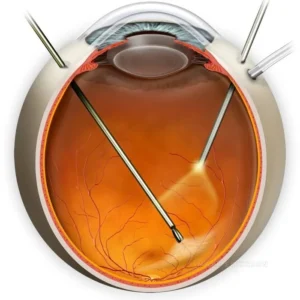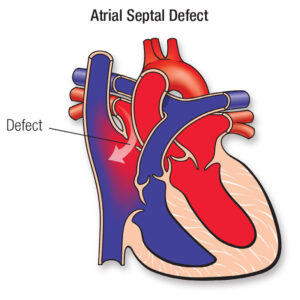Description
An Atrioventricular (AV) Canal defect is a congenital heart defect characterized by a large hole in the center of the heart where the walls between the heart’s chambers meet. This defect affects the septum between the atria (upper chambers) and ventricles (lower chambers), and involves abnormalities in the heart valves, leading to improper blood flow between the chambers12.
Key Features:
- Location: The defect is located where the wall (septum) between the upper chambers (atria) joins the wall between the lower chambers (ventricles)1.
- Valve Abnormalities: Instead of having separate tricuspid and mitral valves, there is a single large valve that crosses the defect2.
- Blood Flow Issues: This defect allows oxygen-rich blood from the lungs to mix with oxygen-poor blood from the body, causing the heart and lungs to work harder1.
Symptoms:
- Difficulty breathing
- Poor weight gain
- Fatigue
- Excessive sweating
- Heart murmurs
Treatment:
- Surgery: Open-heart surgery is typically required to close the hole and reconstruct the heart valves. This is usually done within the first year of life to prevent complications2.
- Medications: Used temporarily to manage symptoms but do not cure the defect1.
Complications if Untreated:
- Heart failure
- Pulmonary hypertension
- Growth delays
Familiarity with Treatment
Treatment for AV Canal defect typically involves open-heart surgery to close the hole and reconstruct the heart valves. This surgery is usually performed within the first year of life to prevent complications such as heart failure and pulmonary hypertension2. Medications may be used temporarily to manage symptoms, but they do not cure the defect1.
Who is it Suitable For?
Surgical treatment is suitable for:
- Infants and young children diagnosed with AV Canal defect, especially those showing symptoms like difficulty breathing, poor weight gain, or heart failure2.
- Children with Down syndrome, as they have a higher incidence of AV Canal defects1.
Who is it Not Suitable For?
Surgical treatment may not be suitable for:
- Patients with severe, irreversible pulmonary hypertension, as the risks of surgery may outweigh the benefits2.
- Patients with other severe health conditions that increase surgical risk.
Advantages
- Improved heart function: Correcting the defect allows the heart to pump blood more efficiently1.
- Reduced symptoms: Surgery can alleviate symptoms such as difficulty breathing and poor growth2.
- Prevention of complications: Early intervention can prevent long-term complications like heart failure and lung damage1.
Complications
- Surgical risks: As with any major surgery, there are risks of infection, bleeding, and complications from anesthesia2.
- Residual defects: Some patients may have residual holes or valve issues that require further treatment1.
- Heart rhythm problems: Arrhythmias can occur after surgery and may need additional management2.
Previous Care
Before surgery, care typically includes:
- Monitoring and managing symptoms: Using medications to control symptoms like heart failure1.
- Nutritional support: Ensuring the child receives adequate nutrition to support growth and development2.
Aftercare
Post-surgery care involves:
- Regular follow-up visits: Monitoring heart function and overall health1.
- Medications: To prevent infection and manage any residual symptoms2.
- Activity restrictions: Gradually reintroducing physical activity as the child recovers1.
If you have any more questions or need further details, feel free to ask!






Reviews
There are no reviews yet.